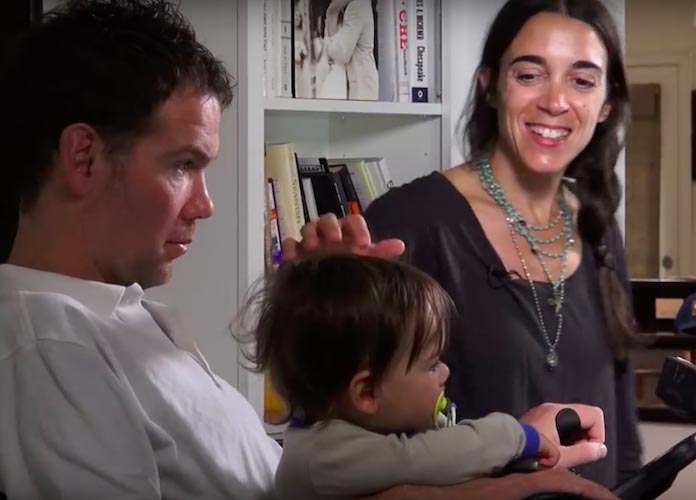Michel Varisco On ‘Gleason’ Movie, Husband Steve Gleason, Fighting ALS
Michel Varisco appears alongside her husband Steve Gleason, the former New Orleans Saints player who was diagnosed with ALS in 2011, in the documentary Gleason that is soon hitting theaters.
Michel Gleason On ‘Gleason’
Gleason received rave reviews when it premiered at the Sundance Film Festival earlier this year. But, according to Michel, when the cameras first started rolling, the intention was only to document Steve for the sake of their son Rivers. The Gleasons never intended for their home movie project to hit the big screen.
“This project began as just a present for Rivers. Steve wanted to make some video journals once we found out we were pregnant that he could leave life lessons to our son Rivers,” Michel told uInterview in an exclusive interview. “I didn’t have any idea that this movie would become something bigger than just a project for Rivers or maybe a small 30 for 30 or something.”
According to Michel, they thought of the cameras as just another member of the family, and didn’t put too much thought into censoring themselves. Though there might be some deeply personal moments of their lives that make Michel uncomfortable to have people viewing, it is worth it to her if it proves beneficial to others and the cause of finding a cure for ALS.
“Once we started watching the first couple cuts of the movie, we definitely went through periods of like, ‘Okay this is super intimate, this is super personal, what are we doing? Should we be showing our deepest most intimate moments to the world? Depending on how big this gets?’” Michel revealed. “I can say now we had those fears, but now showing the movie and seeing how people are reacting to it and how it’s impacting them and how it’s in a way helping people. The more we hear about that the more it makes it okay that we are exposing our lives like this.”
In 2015, the Gleasons’ activism led to President Barack Obama signing off on the Steve Gleason Act, which makes critical technology used by ALS patients available to those on Medicare or Medicade.
“He’s had so many unbelievable accomplishments and that one was a great one — not only just for Steve personally, but all of Team Gleason,” Michel said. “We have a small group of people who work tirelessly for Team Gleason to help other people’s lives with ALS and it was a big win for the team who’ve worked so hard on this. So, it was exciting across the board, not just for Steve but for all of us.”
These days, Michel says that Steve is in a better place than he’s been in years, as he’s grown more or less accustomed to the way his life is now and is focused on continuing to build his relationship with his son.
“He’s better like right now than he’s been in the past couple of years. We’ve gotten through almost all of the lost that he’s gonna have and now he’s on a ventilator that’s breathing for him,” Michel explained. “So, getting past the loss, now he is where he’s gonna be for a long time and we’ve got a team of caretakers who come to help Blair and me. He has fresh young kids who are there to help him with whatever he wants to do — whether it’s taking him to movies or taking him anywhere he wants to go and also helping facilitate his relationship with Rivers, which is his number one purpose in life right now.”
Gleason opens on July 29.
This project began as just a present for Rivers. Steve wanted to make some video journals once we found out we were pregnant that he could leave life lessons to our son Rivers. Soon afterwards, we just started filming not only the video blogs, but we started filming just kind of our daily life and we got two young filmmakers — Ty Minton-Small and David Lee, who were about 23 at the time — to come help when Steve’s hands weren’t working as well or when I was super busy because Rivers was born. I didn’t have any idea that this movie would become something bigger than just a project for Rivers or maybe a small 30 for 30 or something. So, that being said, I never looked at this as anything bigger than that, so I never really paid attention to what happens next. I just kind of lived our life and it was filmed and just treated it like a fifth person in the family.
It was just a project and these guys were living with us, they were filming us, it didn’t cross my mind that day that we were in the bathroom with Steve and thinking that, ‘We shouldn’t be filming this!’ because it just kind of was like it became a part of our lives. That being said, once we started watching the first couple cuts of the movie, we definitely went through periods of like, ‘Okay this is super intimate, this is super personal, what are we doing? Should we be showing our deepest most intimate moments to the world? Depending on how big this gets?’ I can say now we had those fears, but now showing the movie and seeing how people are reacting to it and how it’s impacting them and how it’s in a way helping people. The more we hear about that the more it makes it okay that we are exposing our lives like this.
Reliving it I think for the first couple times is really awkward for me to watch it — and also those times I wasn’t even thinking that everyone else is gonna watch it. But, kind of reliving that...it’s strange watching it, it’s strange living it so it’s really strange watching it.
That scene in particular — people love to talk about that scene though because it’s such a relatable scene to almost everybody who’s a couple or is in a relationship. It’s interesting to see people’s take on it and saying, ‘I can’t believe how honest and real you’re allowing yourselves to be seen,’ but at the same time it’s a reality. Nighttimes were difficult, I wasn’t sleeping, he wanted more attention, it’s a real part of our life and as a result of the disease. We wanted to be as honest as we could be in the movie and that stayed in.
I think both of us get super anxious before it’s about to be shown. I think that day is a type of emotional stress because it’s like ripping off the band-aid of all of our private life. But, no matter what, all the times that we’ve screened it it’s been worth it afterwards to take in the love and support. And to see how it’s impacting people afterwards makes it worth it so far.
He’s had so many unbelievable accomplishments and that one was a great one — not only just for Steve personally, but all of Team Gleason. We have a small group of people who work tirelessly for Team Gleason to help other people’s lives with ALS and it was a big win for the team who’ve worked so hard on this. So, it was exciting across the board, not just for Steve but for all of us.
He’s said it — he’s better like right now than he’s been in the past couple of years. We’ve gotten through almost all of the lost that he’s gonna have and now he’s on a ventilator that’s breathing for him. So, getting past the loss, now he is where he’s gonna be for a long time and we’ve got a team of caretakers who come to help Blair and me. So he has fresh young kids who are there to help him with whatever he wants to do — whether it’s taking him to movies or taking him anywhere he wants to go and also helping facilitate his relationship with Rivers, which is his number one purpose in life right now. So, because the loss is done and he gets to be taken where he wants to go and he’s really developing a strong relationship with Rivers, he’s doing as well as can be despite the fact that he can’t talk or move or eat or any of the regular things humans can do.
RELATED ARTICLES
Get the most-revealing celebrity conversations with the uInterview podcast!



 Click here for the Cannes Film Festival 2015: Best Dressed Slideshow
Click here for the Cannes Film Festival 2015: Best Dressed Slideshow



Leave a comment